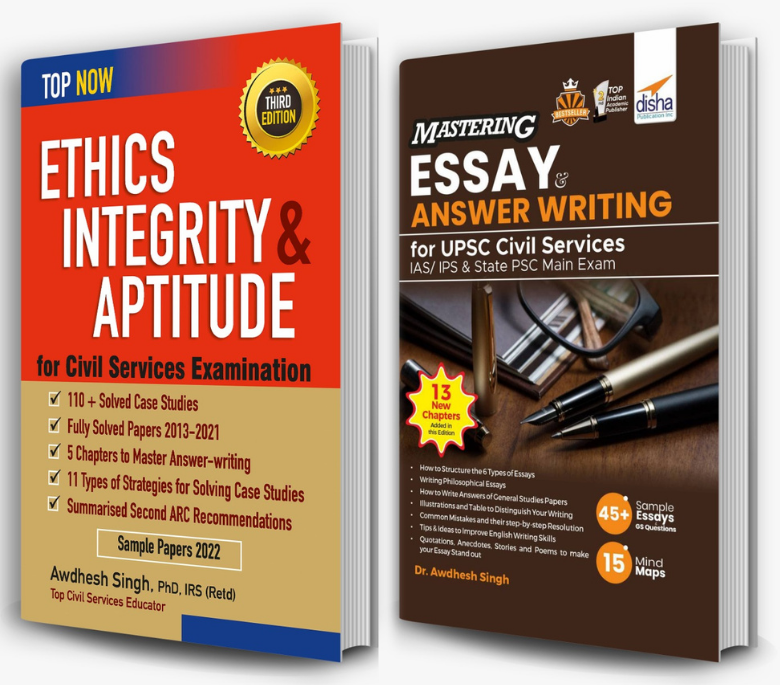Solved Ethics Papers
Topics
All
Civil Services in India (26)
Ethics, Integrity and Aptitude
» Chapters from Book (11)
» Case Studies (8)
Solved Ethics Papers
» CSE - 2013 (18)
» CSE - 2014 (19)
» CSE - 2015 (17)
» CSE - 2016 (18)
» CSE - 2017 (19)
» CSE - 2018 (19)
» CSE - 2019 (19)
» CSE - 2020 (19)
» CSE - 2021 (19)
» CSE -2022 (17)
» CSE-2023 (17)
Essay and Answer Writing
» Quotes (34)
» Moral Stories (18)
» Anecdotes (11)
» Beautiful Poems (10)
» Chapters from Book (5)
» UPSC Essays (40)
» Model Essays (38)
» Research and Studies (4)
Economics (NCERT) Notes
» Class IX (14)
» Class X (16)
» Class XI (55)
» Class XII (53)
Economics Current (51)
International Affairs (20)
Polity and Governance (61)
Misc (77)
Select Topic »

Civil Services in India (26)
Ethics, Integrity and Aptitude (-)
» Chapters from Book (11)
» Case Studies (8)
Solved Ethics Papers (-)
» CSE - 2013 (18)
» CSE - 2014 (19)
» CSE - 2015 (17)
» CSE - 2016 (18)
» CSE - 2017 (19)
» CSE - 2018 (19)
» CSE - 2019 (19)
» CSE - 2020 (19)
» CSE - 2021 (19)
» CSE -2022 (17)
» CSE-2023 (17)
Essay and Answer Writing (-)
» Quotes (34)
» Moral Stories (18)
» Anecdotes (11)
» Beautiful Poems (10)
» Chapters from Book (5)
» UPSC Essays (40)
» Model Essays (38)
» Research and Studies (4)
Economics (NCERT) Notes (-)
» Class IX (14)
» Class X (16)
» Class XI (55)
» Class XII (53)
Economics Current (51)
International Affairs (20)
Polity and Governance (61)
Misc (77)

Q10. Rehabilitation of Adivasis
Q10. Land needed for mining, dams and other large-scale projects is acquired mostly from Adivasis, hill dwellers and rural communities. The displaced people are paid monetary compensation as per the legal provisions. However, the payment is often tardy. In any case, it cannot sustain the displaced families for long. These people do not possess marketable skills to engage in some other occupation. They end up as low paid migrant labourers. Moreover, the benefit of development goes to the industries, industrialists and urban communities whereas the costs are passed on to these poor helpless people. This unjust distribution of costs and benefits is unethical.
Suppose you have been entrusted with the task of drafting a better compensation-cum-rehabilitation policy for such displaced persons, how would you approach the problem and what would be the main elements of your suggested policy? (250 words)
Answer
The activities of mining, constructing dams or other large-scale projects, are important for the development of the economy and for the creation of employment. However, it is also a fact that local people suffer when they are displaced from their native place, where they had been living since generations. They are often given small compensation, which is not enough for leading a decent life after displacement.
Development can become a win-win situation if a better compensation-cum-rehabilitation policy is made keeping the interest of the local inhabitants in mind. The policy should have the following components:
• Locals should be provided the means to develop their own traditional art and culture.
• They should be given the option of shifting out with their close friends and relatives to enable them to live a community-based life.
• They may be given site plots or built-up houses commensurate with their land mass.
• They must be given fair compensation for their land and other properties.
• One adult member of each family may be given employment.
• Resettlement should be done in the neighbourhood.
• If resettlement is not possible in the neighbouring area, priority should be given to the development of irrigation facilities and supply of basic inputs for agriculture, drinking water, wells, grazing ground for cattle, schools for children, primary healthcare units and other amenities in the new locality.
• They should be educated through public meetings and convinced about the benefits of these projects for the nation and for themselves.
• The elderly people of the village should be involved in the discussion and decision making process. (251 words)

Looking for a One-stop Solution to prepare for ‘Ethics, Integrity, and Aptitude’ and ‘Essay and Answer Writing’ for UPSC?
Buy Dr. Awdhesh Singh’s books from the links below-
Buy Dr. Awdhesh Singh’s books from the links below-
Ethics, Integrity & Aptitude for Civil Services Examination
Amazon - https://amzn.to/3s1Qz7v
Flipkart - https://bit.ly/358N2uY
Mastering Essay & Answer Writing for UPSC Civil Services
Amazon - https://amzn.to/3JELE2h
Flipkart - https://bit.ly/3gVIwmv
| Related Articles |
| Recent Articles |
